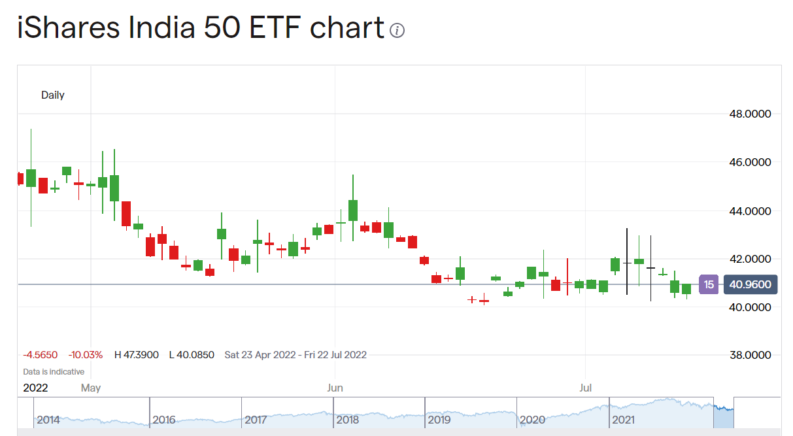Key points:
- Trading India can be technically difficult
- Perhaps a Nifty 50 Index ETF is the way to go?
- A volatile and largely uncorrelated asset has its trading uses
- key point
If we want to trade India then given the lack of detailed knowledge most of us will have about it we might well want to look at the iShares S&P India Nifty Fifty Index ETF (NSASDAQ: INDY). Even if we do have detailed knowledge of the Indian markets this might still be the way to trade overall movements – in the same way that S&P 500 ETFS are a good way to gain exposure to the American markets. All for the same reason of course, the Nifty 50 is the 50 large capitalisation stocks on the Indian exchanges. While trading an index – or an ETF of the index – will lose some subtlety it will expose us to overall market movements.
Almost as an aside there have been two nifty 50s in stock market history. In the 60s and 70s the US exchanges had this as an informal name for a group of large caps. Nowadays it means that Indian large cap index.
The Indian markets and exchanges display marked price volatility. We should rather expect this as the country is going through a grand burst of economic growth. This changes the relative positions of large companies rapidly – that's rather what economic growth actually is. It's also true that the high internal growth to India means the stock market performance rather diverges from those of other markets. It's not a completely unlinked asset, but it doesn't necessarily move in parallel with New York and London.

Also read: Best Short Term Stocks To Buy In India 2022.
So, we might well be interested in a Nifty Fifty Index ETF. We are able to trade movements in a largely uncorrelated asset in a foreign market but knowing that we ourselves are resolutely at home on NASDAQ. That all has a value. As does having the currency effects buried within the ETF rather than our having to deal with Indian rupees and so on.
Something we always do point out about index ETFs. Leveraged ones are not for long term holdings. The very creation of the leverage means that a leveraged ETF will lose money over time. Thus they are for short term speculations or hedges. On the other hand an unleveraged one, like this Nifty Fifty Index ETF, does not have that value destruction built into it. We may or may not wish to hold the Indian market long term but this is a possible method of doing so.
It's also possible to think a little more about this. Liquidity in the iShares S&P Nifty Fifty Index ETF isn't all that great. 50k units a day traded perhaps. This illiquidity means that it might not trade wholly accurately against the Nifty 50 itself. This could be worth exploring given time zones. The Indian market will be closing by the time New York opens, there might be a time arbitrage available there. This though would need considerable study in detail before confirming. We mention it only as a possibility.
The value of the Nifty 50 is really that it's a not wholly correlated asset with the New York markets, one with considerable price volatility. For those looking for such assets it's worth investigating.
